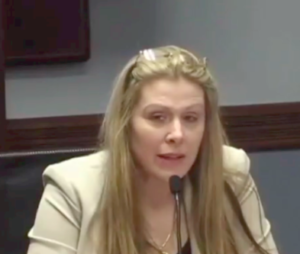BBG Watch
 Ann Noonan, Executive Director of the Committee for U.S. International Broadcasting (CUSIB – CUSIB.org), appealed to the Broadcasting Board of Governors (BBG) members not to reduce radio broadcasts to the most vulnerable and poor Chinese and Tibetan citizens, and not to reduce budgets for Radio Free Asia (RFA).
Ann Noonan, Executive Director of the Committee for U.S. International Broadcasting (CUSIB – CUSIB.org), appealed to the Broadcasting Board of Governors (BBG) members not to reduce radio broadcasts to the most vulnerable and poor Chinese and Tibetan citizens, and not to reduce budgets for Radio Free Asia (RFA).
“Can any Governor here at this table assure CUSIB that radio broadcasts into China will be protected, especially since we all know that the crackdown on internet users inside China is causing the arrest and imprisonment of Chinese freedom fighters, Roman Catholics and people of other faiths, democracy seekers, and women who don’t want to be forcibly aborted,” Ann Noonan asked.
“CUSIB values the services and the soft diplomacy RFA provides. With China flexing its muscles all over the world (censoring the internet, putting military assets in the South China Sea, cracking down domestically on every human right, especially religious freedom) it defies understanding that RFA is doing more and more every year on less and less money,” Noonan said.
CUSIB requested for the public to have access to the BBG’s U.S. International Media Coordinating Council (ICC) meeting minutes, and for these meetings to be open to the public.
CUSIB’s Executive Director also expressed hope that new, highly-qualified outside candidates will be selected as soon as possible to lead VOA and RFE/RL.
Ann Noonan made her appeal at an open BBG board meeting in Washington, D.C. on February 26, 2016.
STATEMENT BY ANN NOONAN, EXECUTIVE DIRECTOR OF COMMITTEE FOR U.S. INTERNATIONAL BROADCASTING (CUSIB – CUSIB.org), TO BROADCASTING BOARD OF GOVERNORS (BBG), FEBRUARY 26, 2016
Thank you Mr. Chairman.
My name is Ann Noonan and I am the Executive Director for the Committee for U.S. International Broadcasting.
For the record, this week marks my 5th year working on these issues. Before that time, while I knew what Voice of America, Radio Free Asia and Radio Marti were, I had no idea what the BBG was. Now I do.
Since Ted Lipien and I founded CUSIB, which for those who may not know, is a bipartisan volunteer NGO that supports journalism for media freedom and human rights, we have been able to provide assistance to journalists and people here at the BBG.
CUSIB hopes that new, highly-qualified outside candidates will be selected as soon as possible to lead VOA and RFE/RL.
When the United Nations recognized World Radio Day last week, I saw a message asking: Why is radio so important? Their answer was: Because 95% of the world have access to it – far more than internet or TV.
While CUSIB is relieved to see no cuts nor reductions in Cantonese, Mandarin or Tibetan radio services in the BBG’s 2017 budget, I know that there is still strong opposition to Voice of America shortwave and medium wave radio services, and some of those opponents are right here in this room.
Can any Governor here at this table assure CUSIB that radio broadcasts into China will be protected, especially since we all know that the crackdown on internet users inside China is causing the arrest and imprisonment of Chinese freedom fighters, Roman Catholics and people of other faiths, democracy seekers, and women who don’t want to be forcibly aborted.
CUSIB remains concerned about poor people in China and Tibet who do not have access to cell phones or the Internet, and who are desperate for uncensored news and basic human rights.
With a quick look at the BBG’s 2017 proposed Budget, I have to ask how the BBG proposes to “give hope to million” while proposing cuts to RFA, expecting them to operate at 2012 levels. (And yes, at the same time, there are proposed increases for the already bloated International Broadcasting Bureau.)
Can any Governor here at this table explain to CUSIB why the budgets for other entities have been increased, but RFA’s budget has been reduced. Is RFA’s work not valued?
CUSIB values the services and the soft diplomacy RFA provides. With China flexing its muscles all over the world (censoring the internet, putting military assets in the South China Sea, cracking down domestically on every human right, especially religious freedom) it defies understanding that RFA is doing more and more every year on less and less money.
CUSIB supports RFA’s expansion into television but again, why are they doing this with zero increase?
CUSIB would like to request for the public to have access to the ICC meeting minutes, and for these meetings to be open to the public. In the spirit of transparency in government, we would like to know what transpires at these meetings and we would like for these meetings to be livestream and accessible to the general public.
We also request for the speaking time for the public to be extended from 3 minutes to 5 minutes.
Thank you.
